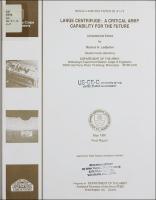Please use this identifier to cite or link to this item:
https://hdl.handle.net/11681/10315Full metadata record
| DC Field | Value | Language |
|---|---|---|
| dc.contributor | United States. Assistant Secretary of the Army (R & D) | - |
| dc.contributor.author | Ledbetter, R. (Richard) | - |
| dc.date.accessioned | 2016-06-20T13:54:18Z | - |
| dc.date.available | 2016-06-20T13:54:18Z | - |
| dc.date.issued | 1991-05 | - |
| dc.identifier.uri | http://hdl.handle.net/11681/10315 | - |
| dc.description | Miscellaneous Paper | - |
| dc.description | Abstract: This report presents an overview of potential applications of a proposed US Army Engineer Waterways Experiment Station (WES) centrifuge for the purposes of research and development. Centrifuge testing applications correspond with the technical areas representative of the research conducted by the five laboratories and the Coastal Engineering Research Center of WES, and the Cold Regions Research Engineering Laboratory. The broad technical research areas discussed are (A.) coastal, (B.) cold regions, (C.) environmental, (D.) geotechnical, (E.) hydraulic, and (E.) structural. This report discusses those areas where centrifuge testi ng would greatly benefit research objectives particularly in cases where prototype data are very expensive if not impossible to acquire. Centrifuge testing offers cost effective technology to address military and civil problem areas. Among many advantages and benefits of a centrifuge to the Corps of Engineers are (1.) for complex problems for which calculation methods are not completely reliable or adequate, prototype behaviors can be predicted, (2.) numerical methods can be validated, improved, or developed based on realistic prototype behavior, and (3.) centrifuge tests can be used for parameter studies to investigate particular properties and behaviors in relation to variations in loads and boundary conditions. Centrifuge testing will allow the economical proof testing of designs, investigation of problem areas, and validation of numerical methods that have been prohibitively expensive to study with prototype testing. Also, centrifuge testing will allow the study of important behavior phenomena, including failure, that are impractical or not feasible to induce in prototype situations or for complex problems. | - |
| dc.publisher | Geotechnical Laboratory (U.S.) | - |
| dc.publisher | Engineer Research and Development Center (U.S.) | - |
| dc.relation | http://acwc.sdp.sirsi.net/client/en_US/search/asset/1041643 | - |
| dc.relation.ispartofseries | Miscellaneous paper (U.S. Army Engineer Waterways Experiment Station) ; GL-91-12. | - |
| dc.rights | Approved for public release; distribution is unlimited. | - |
| dc.source | This Digital Resource was created from scans of the Print Resource | - |
| dc.subject | Centrifuge testing | - |
| dc.subject | Coastal research | - |
| dc.subject | Cold regions research | - |
| dc.subject | Environmental research | - |
| dc.subject | Geotechnical research | - |
| dc.subject | Hydraulic research | - |
| dc.subject | Soil-structure interaction research | - |
| dc.subject | Structural research | - |
| dc.subject | Soil mechanics | - |
| dc.subject | Soil dynamics | - |
| dc.title | Large centrifuge : a critical army capability for the future | - |
| dc.type | Report | en_US |
| Appears in Collections: | Miscellaneous Paper | |
Files in This Item:
| File | Description | Size | Format | |
|---|---|---|---|---|
| MP-GL-91-12.pdf | 21.79 MB | Adobe PDF |  View/Open |